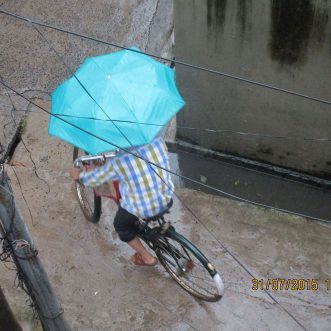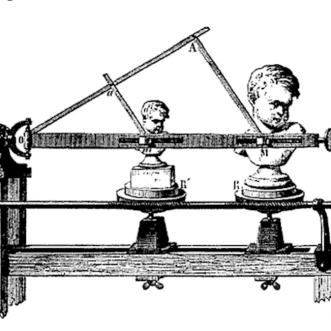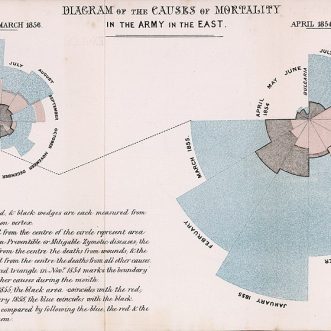
Infrastructure
How do you create a foundation for living your Promise of Value that is both rigid and flexible? You could … Read More “Infrastructure”

How do you create a foundation for living your Promise of Value that is both rigid and flexible? You could … Read More “Infrastructure”

Big businesses (or perhaps just their shareholders) crave nothing more than the certainty of increasing profits. That’s what capitalism means.
To that end, they put a hard boundary around their businesses, turning them into closed systems, where everything is rigidly controlled, organised to maximise profit and nothing else.
The trouble is that a closed system cannot learn. So when the life around that business changes (as it certainly will) the only way for a closed-system business to deliver the certainty it promises to shareholders is first, to eat itself, generating ‘shareholder value’ by shrivelling it’s own organs, or selling them; or, worse, to seek to impose control onto its surroundings, turning them as rigid and sterile as itself.
Good businesses, the ones that get to stay big and profitable without financial or geopolitical engineering, are those that put a border around themselves instead.
Borders are permeable. They allow new ideas in, act as an early warning system for change, create a safe space for experimentation. They turn a closed system into an open one, yet retain enough control to allow a business to choose which changes they adopt, on purpose.
The best businesses add a twist to this.
They create themselves as an open system for making and keeping promises – not to shareholders, but to their customers. Profits become a side-effect of the system’s purpose. And ironically, become more certain.
They stick to their promise, always learning from their customers and their team what the world outside wants, and re-package their promise to meet that demand, adjusting the way the share and keep it along the way.
Great businesses constantly balance order with openness to get the best of both worlds, a business that can thrive forever, whatever the circumstances.

Discipline makes Daring possible.

In ‘The Uncertainty Mindset’, Vaughn Tan describes an interesting situation:
The assistant chef responsible for the popular lunchtime canelloni dish can’t keep up, and despite following instructions can’t consistently get the finished dish to look as it should, so some are sent back. This goes on for weeks.
It takes the owner walking past one lunchtime to spot the problem, discuss the problem with the assistant chef, then take the problem off to the experimental kitchen team for fixing.
It makes some sense for an innovative, high-end kitchen, operating at the cutting edge of dining to separate innovation from the everyday. A busy restaurant needs to run like clockwork, there’s no room during service for experimentation.
But not every problem needs a separate crack team to solve it. Given a bit of space and time outside normal service (more staff working shorter shifts), the assistant chef and their peers could probably have arrived at the same solution, which was a different method of assembly, that took up less time, less space and produced a more consistent result. Only if that failed should the problem have perhaps been passed across to the experimental team for a deeper look at the recipe.
Given regular space and time outside normal service, the restaurant team could solve many such problems, eventually including recipe problems, learning from each other as they go until each of them is able to tweak the process almost seamlessly. That way, the regular team also becomes the crack team.
That’s an idea that’s not just for restaurants.

Some people like to push the idea that ‘tech’ will be the answer to all our woes.
And they’re right.
Just remember that ‘tech’ isn’t necessarily their tech.
Breeding deep-rooted perennial wheat and rice is ‘tech’. Wind-powered ships are ‘tech’. Permaculture and agro-forestry are ‘tech’. Line-fishing is ‘tech’. 15-minute cities are ‘tech’. A circular economy is ‘tech’. Flint knives are ‘tech’. Bark-cloth is ‘tech’. All of these technologies have been used in the past and are being used right now. We don’t even need to invent them.
But the ‘tech’ that will really save us is our imagination. If we use it to design ways of being that will work with our planet instead of against it.
We’ve done that before too.
Discipline makes Daring possible.
HT to Dave Foulkes for the prompt.

If what everyone really wants is something like this:
Then your impact on people is about how much you help or hinder them in their quest to achieve it.
Do you enable people to earn enough to rise above meeting basic needs? Do you free their time to focus on finding and following their purpose? Do you help them to master skills and capabilities that will increase their agency and autonomy? Do you help them connect to a community that values them?
How could you measure these things?
A good place to start might be to look at what changes when it works. What are the symptoms of that change? How few of them could you measure to tell you the effect your business has had?
Of course you’ll want to measure these things for your clients.
Remember to measure them for your team and yourself too. You’re all involved.

When you’re composing your Customer Experience Score, it’s important to remember that your customer experience music has always been there.
If it wasn’t your business wouldn’t be doing as well as it is. You have clients who love what you do for them. You have employees and suppliers who love working with you. The music is there and it appeals to others. You’re an expert at playing it.
When we become experts, we turn things we used to have to think about into habits we unconsciously perform. Some of those habits are excellent. Some are not so good. They’re simply the habit we got into that made things ‘good enough’ at the time.
Some habits are downright bad, but we keep using them because to do otherwise takes conscious effort, and when you’re busy looking after clients and teams, that’s hard to do.
Your first job as ‘composer’ of your Customer Experience Score is to make the music as good as it can possibly be. To surface all your habits, and consciously choose to keep the excellent ones, improve the ‘good-enough’ ones and ditch the bad ones.
It’s an opportunity to deliberately assess whether you could do even more for your clients, or do what you do 10 times or a 100 times better. To make sure that your music truly reflects your Promise of Value, and to re-shape it so that it does.
This is not straightforward. Dredging stuff up from your subconscious is hard work. So it helps to have a framework to build on, and a critical friend to encourage you, push you, suggest solutions and hold you to account.
That’s where I come in.
Discipline makes Daring possible.
“The changes and processes you recommended are coming together nicely. But it all takes so much time! Slowly but surely I’m disappearing as a boss though :).“

The reason why voter ID is such a bad idea, is that any physical object capable of serving as a ‘unique identifier’ can by definition be forged. If the technology exists to create it, the technology exists to forge it.
The same is true of a physical product or service. Almost anything about it that you can consider as ‘unique’ can be copied, reverse-engineered or reproduced by someone else.
And will be if you are successful.
The processes around your product are harder to copy, but not impossible. Otherwise franchises wouldn’t exist.
But the values, emotional labour and personality you put into making and keeping the promises around your product or service are uncopiable. Especially if you allow everyone in your team to bring their own self to bear too.
Consistency, not uniformity, is what you’re after.
That’s what makes scaling safe.

It may not feel like it, but regulation is simply another form of feedback for your business. It just happens to be the kind of feedback you are not allowed to ignore.
Think of it as feedback from your industry. Lessons learned by others that can save you grief. Of course not all of it is designed to help your business, sometimes it’s the result of bigger players flexing their muscle in the market, to make it harder for businesses like yours. Even that is useful feedback – telling you where the bigger players feel vulnerable. Use it to your advantage.
Since you can’t ignore regulatory feedback, it pays to have a really clear Promise, and plenty of the other kinds of feedback coming in regularly, so that you can make sure the requirements of regulation can’t unduly distort your unique way of making and keeping your Promise to the people you serve.
That means that as far as possible, compliance, like admin, needs to be a side effect of doing what you’re here to do, not the other way around.
Of course you need to be compliant, but the regulator shouldn’t come first.
They’re not your customer.

My interest in documenting how things should work came from my years in software development. To me, it always seemed sensible to work out what you wanted your software to do before you built it, or bought it.
And even more sensible that it should reflect the way you do business rather than an average of hundreds of other firms.
Writing a customer Experience Score before you commission software has other benefits too.
It gets everyone thinking about change – ‘how we really want it to work’ rather than simply ‘how we do it now’.
It gets everyone thinking a level up from the day-to-day, about what has to happen when rather than how it happens.
But most of all it gives everyone, including you, the chance to reframe your business from a management hierarchy to an easily replicable system for making and keeping promises.
And the benefits keep coming after you’re done. Once you can demonstrate that your unique system for making and keeping promises works consistently, people will ask you to do more of it for them. And you will find it easy to scale up on delivery.
Like many a human enterprise, the hard work is all up front, but worth it for the dividends flying in later, almost effortlessly.
And isn’t that just what it means to be an entrepreneur?

When action takes place without evidence, based on bias and assumption, or merely indifference; seeing incontrovertible facts presented in a compelling format can kickstart a change in behaviour.
That’s what Florence Nightingale achieved when she sent a copy of “Notes on Matters Affecting the Health, Efficiency, and Hospital Administration of the British Army” to Queen Victoria.
There were undoubtedly many more facts Nightingale could have observed. The height of patients, their propensity to swear, their educational attainment, their places of birth.
But those facts weren’t what mattered to her. What mattered was how many were dying unnecessarily.
Data is increasingly easy to collect. Resist the temptation to use it all. Decide which facts matter to your business and measure those.
That way you’ll have a better chance of changing the right behaviours.